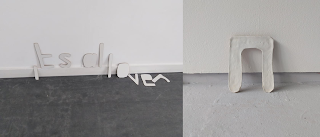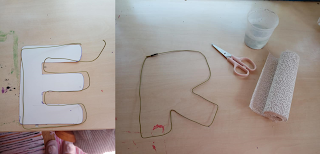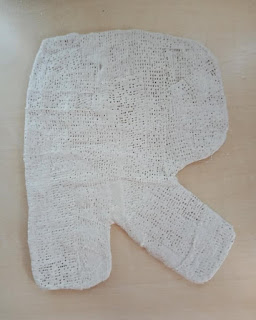Since completing the Sculpture Matters workshops hosted by NUA remotely in the last couple of months I have been drawn into exploring my text more sculptural. After the Sculpture Matters workshop I wanted to play with the ModRoc and see how it could work within my art practice.
 |
| ModRoc Sculpture Matters Outcome, 2020 |
This is not something new to my practice, but it is something that has
fallen from my practice in the last two years. The last time that I explored
more sculptural text was during my MA, at this time I was exploring wooden
board and plaster.
 |
| Wooden and Plaster Letters, 2018 |
Since Sculpture Matters, I have returned to plaster, but this time in the form of ModRoc. This material is perfect of me at it fits into my DIY art process and aesthetic. It is simple and only requires simple tools and processes to create something from it (Vam, 2017). It is also relatively cheap (Benjamin, 2015).
I have been using this with wire, creating letter frames based on my
font ACcomplete4 and then covering them in ModRoc to create the final outcome. The
intention is for these to be installed in outside environments and the ModRoc comes
with the bonus of bring white, allowing for it to stand out from the background
making it easy to read from a far.
 |
| Wire Letter Frames, 2020 |
I do not want to paint or ‘finish’ the ModRoc lettering as I want them
to retain their DIY-ness and imperfections. The finish is not even the biggest
imperfection with these, I found that during the process of adding the strips
to the wire frame the letters became a little distorted from the weight of the ModRoc
and from the handling, meaning that they are not perfect representations of the
font they are based upon. For my practice this is not an issue as I think it is
important that something that is given shape by hand reflects that – if I
wanted them identical there are many other processes I could have used. It just
adds to each being its own entity, they are 'originals' of sorts (Judovitz,
1998), but also multiples Each has come about by the same process, but this has
not been an identical experience (Benjamin, 2015).
 |
| ModRoc R, 2020 |
In the creation of the letters there is a focus on each as an individual linguistic unit (Katamba and Kerswill, 2009), rather than on a final word or outcome. The intention being that the collection of linguistic units could be put together in many ways to make many words.
ModRoc Letter Collection, 2020
Going forward I plan to grow the collection, before playing with the arrangement and installation of them. My initial idea is to have them as something that the public would be able to interact with and move around themselves.
References
Benjamin, W. (2015) Illuminations. London: Penguin.
Judovitz, D. (1998) Unpacking Duchamp: Art in Transit.
University of California Press.
Katamba, F. and
Kerswill, P. (2009) English Language: Description, Variation and Context.
Palgrave; 2009 edition.
Vam. (2017) Plywood: Material of the Modern World. [online] https://www.vam.ac.uk/exhibitions/plywood-material-of-the-modern-world.
[accessed 18/07/20].




No comments:
Post a Comment